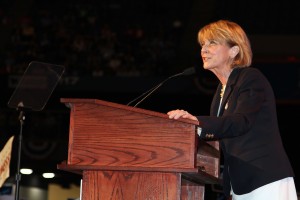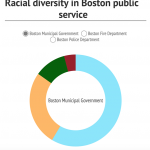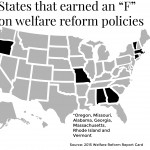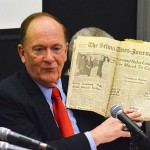
Massachusetts Attorney General and 2014 gubernatorial candidate Martha Coakley filed a brief Thursday with the U.S. Supreme Court encouraging the judges to readdress pending cases regarding same-sex marriage, claiming that the ban on same-sex marriage is unconstitutional.
“Our experience in Massachusetts clearly shows that allowing same-sex couples to marry has only benefitted families and strengthened the institution of marriage,” Coakley said in a Thursday press release. “We urge the U.S. Supreme Court to take up this important civil rights issue and ensure equal access to marriage for all couples nationwide. Laws that bar same-sex couples from marrying are discriminatory and unconstitutional.”
Coakley and her team filed the brief on behalf of the Commonwealth of Massachusetts as well as 14 other states including Vermont, Washington state, Delaware and California.
More than 30 states do not allow same-sex couples to legally wed, the release stated, nor do they acknowledge same-sex marriages registered by other states.
“Some estimates suggest that as many as 200,000 same-sex couples have already wed in the United States,” the brief stated. “Yet many of these couples experience few, if any, of the benefits, protections, or obligations that flow from civil marriage, because they reside within the thirty-one States that currently ban such unions. Thousands of other couples anxiously await the chance to wed the partner of their choosing in their home states.”
Coakley has worked with several civil rights organizations in the past, and Kara Coredini, executive director of MassEquality, said the organization will continue to support Coakley on the issue.
“MassEquality has been working hard every day to support Martha Coakley’s bid for Governor, fighting for her the way she has fought for us,” she said in an email statement. “Because of the early and sustained leadership of leaders like Martha Coakley, support for the ability of loving, committed couples to marry is at an all-time high and growing every day. It’s a simple matter of fairness.”
Coredini said the sweeping legalization of same-sex marriage will strengthen couples, families and communities.
“Justice delayed is justice denied,” she said. “Massachusetts has celebrated marriage equality for 10 years. The results are conclusive – families are stronger and communities are healthier when everyone is treated with dignity and respect. We are eager to see the Supreme Court usher in an era of justice for all on this issue, and we applaud Martha Coakley in her ongoing effort to lead not only our Commonwealth but our entire country to that just day.”
MassResistance Founder Brian Camenker said Coakley’s Supreme Court motion is “disgraceful,” and accused the gubernatorial candidate of misusing her power.
“Martha Coakley is using the office of Attorney General and taxpayer resources to push a radical social agenda on the federal level,” he said in an email. “This has nothing to do with Massachusetts laws or the official duties of the Attorney General. It does not even affect Massachusetts citizens. Furthermore, Coakley’s reasoning consists of a deeply flawed interpretation of the Fourteenth Amendment.”
Jack Beermann, a Boston University professor of law whose expertise includes civil rights and constitutional law, said people have fought for marriage equality rights since the 1960s, and the government has justified such distinctions by citing tradition, a reason that has been refuted by many courts.
“People have realized that nothing terrible is going to happen to the state of Massachusetts. Nothing terrible happened. It [the legalization of same-sex marriage] didn’t affect anyone else’s lives. It didn’t affect anyone else’s marriages. All it did was make life better and easier for a significant proportion of the population,” he said. “It didn’t happen as quickly as most people see it as happening, but it seems to be a legal reform whose time has come.”
Beermann said the absence of national rule on this issue could cause difficulties across the country, difficulties that Coakley’s brief could help to reform.
“People get married in Massachusetts, and then they move somewhere else, and then a custody fight comes up, and it’s very uncertain what the legal status of those relationships is, especially with children,” he said. “If people get married in Massachusetts, they may not be able to get divorced in the state that they ultimately live in, for example.”
Several residents said same-sex marriage should be a choice left entirely to those individuals who wish to be wed.
Tina Lenahan, 30, of Dorchester, said she knows same-sex couples who have been wed in Massachusetts but have had trouble living in areas that have not legalized same-sex marriage.
“One of my friends was one of the first lesbians to get married in the state of Massachusetts. I know from talking to them, it’s important for them to feel that commitment [brought by marriage],” she said. “They want to be able to say, yes, this is who I am, this is what I’m doing, and no one has the right to say it’s not.”
Jeff Laberge, 32, of Boston, said he agrees with Coakley’s efforts, though there are other more important issues that she should be addressing.
“I believe in equal rights. I think we are all equal, and we should be treated equally,” he said. “But I don’t think the Attorney General should be spending her time and resources on this. There are bigger things to worry about other than just same-sex marriage. There’s a big problem with homelessness. There are all kinds of things she could be working on, like drug programs and job funding.”
Madhura Baxi, 24, of Allston, said support for Coakley’s motion may be rooted in the current generation’s tolerance of same-sex marriage as compared to older generations.
“In this era, at least our generation of people would support it and would appreciate it. We are more flexible towards new opinions and new thoughts,” she said. “It’s unfair for people to treat them [same-sex couples] poorly. Everyone has his or her own choice, and no one else has a say in what someone else wants to do.”




